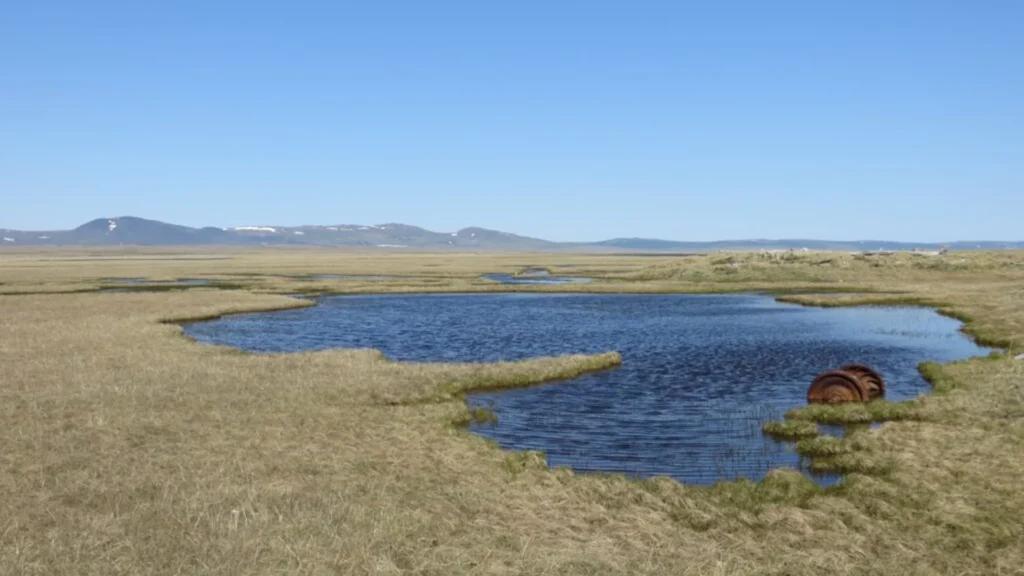Representatives from four agencies arrived in Wales recently, equipped with 40 pizzas and a slideshow on polar bear deterrents. It was one of the final meetings of a years-long effort to start a community-run polar bear patrol with help from the Alaska Nanuuq Commission, the North Slope Borough, the World Wildlife Fund, and the U.S. Fish and Wildlife Service.
Events kicked off on June 14th with a pizza party for the Wales community and continued all week with training sessions and discussions of patrol logistics.
There isn’t a huge number of polar bears passing through Wales, but the community has had several close encounters. During one session, people shared stories of opening the front door to find a polar bear just outside and even seeing one chase a teacher into the school.
For Christine Komonaseak, school safety is a key reason for creating the patrol. She’s a cook at the Wales School and said she worries about students during the winter when they walk to class in the dark.
“The kids who have been beating me to work — I want the safety for them, because they walk from up here to down there,” she said. “The bears have been spotted by the parsonage, by the school. The one that they last killed — I spotted that one below the house eating on a walrus. That was the one they killed by the playground.”
The patrol’s mission is to minimize conflicts between people and polar bears for the safety of both. If bears do enter the community, the patrol will scare them away with noise, light, or non-lethal ammunition. Protecting the people comes first, but conserving the bear population is important too, given their status as a threatened species and their role as a subsistence resource.
When the volunteer patrol starts, as early as December, Greg Oxereok will be on the squad. He said creating a patrol in Wales just makes sense as a proactive safety measure.
“Safety should be number one, especially somewhere like this where it’s rural and it’s hard to get transportation and facilities,” he said. “It’s good to try to stop a problem before it starts. It just makes sense to protect and try to serve our community.”
For now, details are still being discussed — where the patrol will be based, when it’ll sweep the town’s perimeter, and how many patrollers will be on duty at a time. While the agencies are providing equipment like ammunition, radios, and a snow machine, the Wales community will manage the patrol itself. The IRA will take the lead, but the City Council and the Wales Native Corporation are also involved, with all three bodies recommending patrollers for the job.
Jack Omelak, executive director of the Alaska Nanuuq Commission, emphasizes the patrol is a Wales initiative. The community makes the decisions, and the agencies are there to help with training and supplies.
“We get our authority to work on your behalf from you,” Omelak told the community. “We don’t just take it upon ourselves to do it. So we need to be informed and people [from Wales] need to be involved.”
That includes letting traditional knowledge shape the patrol’s strategy. Craig Perham, a biologist with the U.S. Fish and Wildlife Service, encouraged patrollers to work with elders and learn how the community has dealt with polar bears for generations.
“Certainly, there are biologists like myself in Anchorage, and we can help when we can. But you’ve got that experience right here — the older guys who have been out hunting,” he said.
Oxereok, who’s 30, says he looks forward to connecting with elders through the patrol, especially since he doesn’t have much firsthand experience with hunting or warding off polar bears.
“There is a generation gap. And this might help dispel some of that distance between the older generation and my generation,” he said. “The more we can work together, the more we can grow as a whole.”
The four agencies will evaluate the Wales polar bear patrol once it’s up and running to identify what works and what doesn’t. Omelak said they’re treating it as a pilot program for a polar bear management plan that will develop over 10 years and cover the Bering Strait Region.











